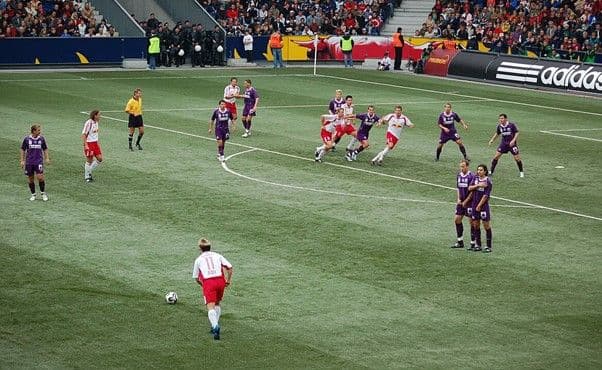Football
What’s The Difference Between Direct And Indirect Free Kicks In Football ?
Free kicks are an integral part of football, but there are many differences between direct and indirect free kicks in the laws of the game. Let us find out what they are.

Understanding The Rules: Difference Between Free Kicks and Indirect Free Kicks in Football
A free kick is awarded to a team when an opposing player commits a foul on the football pitch. This foul will result in either a direct or indirect free kick depending on the infraction. This allows the wronged team to take an uncontested kick from the spot where the foul occurred.
Free kicks are an integral part of the game, and they provide respite for defending teams and attacking opportunities for the offensive team. When close enough to the goal, free kicks allow scoring opportunities for teams with accurate dead-ball specialists. Players can score directly from direct free kicks, but not indirect free kicks, where a player must pass or cross the ball to their team-mates.
However, if the attacking side inadvertently scores from an indirect free, the goal will be ruled out and a free kick awarded to the defending side. There are some exceptions to the free kick rules. If a foul is awarded in a side’s own goal area, then they can move the ball wherever they like within that area of the field. Should the offence or infraction take place off the field, then play is restarted at the nearest point to where the foul occurred. The referee may award an indirect free kick and restart play from where the ball was when the game was stopped, but only for certain offences. It is important to understand this intricate and technical rule, whether you are a player, coach, or football supporter. SportsBoom is here to break down the free kick rule to help better understand the difference between a direct and indirect free kick.

Image Credits: Markus Dallarosa
Greatest Free Kick Goals Scorers Football in History
| Rank | Player | Country | Goals |
| 1 | Juninho |
Brazil | 77 |
| 2 | Pele | Brazil | 70 |
| 3 | Victor Legrotalie | Argentina | 66 |
| 5 | Ronaldinho | Brazil | 66 |
| 6 | David Beckham | England | 65 |
| 7 | Lional Messi | Argentina | 65 |
| 8 | Cristiano Ronaldo | Portugal | 63 |
| 9 | Diego Maradona | Argentina | 62 |
| 10 | Zico | Brazil | 62 |
| 11 | Rogerio Ceni | Brazil | 62 |
| 12 | Ronald Koeman | Netherlands | 60 |
Greatest Free Kick Goals Scorers Football in History
What is the difference between a direct free kick and indirect free kick in football?
There are several distinct differences between direct and indirect free kicks. The difference lies in the type of contact allowed with the ball before a goal can be scored. An attackingplayer can score a goal directly, without any additional touches or passes from other team- mates.
An indirect free kick, however, requires the ball to make contact with another player before a goal can be scored. This slight variance in rules has notable implications for the execution and strategies employed during free kick routines by both the attacking and defending teams.
When referees blow their whistle for a foul, they extend their arms horizontally. This indicates that a direct free kick has been awarded. When referees blow for a foul but raise their arms vertically above their head, this indicates that an indirect free kick has been given. Indirect free kicks are awarded less frequently than direct free kicks.

Image Credits: Paladisious
Fouls Resulting in Direct Free Kicks
Direct free kicks are awarded for more severe fouls. This includes many indiscretions, which are known as “professional fouls.” Kicking, tripping, pushing, pulling, holding, or charging an opponent are all deliberate tactical fouls, which directly impede the progress of the opposition.
These fouls often occur in areas where goal scoring opportunities are more likely, but not always. Sometimes these fouls are deployed to stop an attack or counter-attack and happen all over the field. If any of these fouls take place inside the defending teams 18-yard area, a penalty is awarded.
For a direct free kick, the ball is placed on the ground from the spot of the foul. The attacking player must shoot towards the goal without any interference from the defending players. The attacker taking a direct free kick can only touch the ball once. The free kick must be taken where the foul was committed. The defending team often forms a wall of players to protect against the shot at goal unless the free kick is out of shooting range.

Image Credits: Ardfern
Fouls Resulting in Indirect Free Kicks
Indirect free kicks are awarded for less severe fouls. They are given for impeding an opponent’s progress or obstructing the goalkeeper’s movement result in indirect free kicks. Playing the ball twice, without another player touching it, or offsides are technical offences that also result in indirect free kicks.
Dissent, a goalkeeper illegally handling the ball in the penalty area, attempting to play the ball while the ‘keeper is releasing the ball, abusive, insulting, or offensive language, also lead to indirect free kicks.
Like a direct free kick, an indirect free kick sees the ball placed stationary on the ground. However, instead of attempting to score directly from a shot, the attacking team passes, crosses, or lays off the ball to another player before attempting to score, or start another attack.

Image Credits: Jon Candy
Penalty-related reasons for Indirect Free Kicks
There are penalty-related reasons why the referee might award an indirect free kick. Firstly, if the penalty did not go forward, or the attacker taking the penalty used an illegal feint or shimmy to distract the ‘keeper. Secondly, if a player other than the identified spot-kick taker takes the penalty.
Another reason is if an attacking player encroaches the 18-yard area during the penalty kick and the penalty is not scored, an indirect free kick is given to the defending team. Finally – and rarely – if both the penalty taker and goalkeeper commit an offense at the same time and the spot-kick is scored, an indirect free kick is given.
For more features, guides, and the latest news in the world of football, stay connected to SportsBoom.com.
FAQs
Juninho has scored the most free kicks in football history. The Brazilian scored 77 free kicks during his club and international career.
Cristiano Ronaldo is the most prolific free kick taker in UEFA Champions League history, scoring 12 goals in his career.

Kaylan Geekie is a sports fanatic. He attended Durban High School before moving to Scotland, where he lived for 15 years. During his time in the United Kingdom, Kaylan graduated with a first-class BA Honours Degree in Sports Journalism at the University of the West of Scotland. Kaylan worked for nine years as the Match-Day Editor of SuperXV.com, reporting on Super Rugby, The Rugby Championship, the 2015 Men's Rugby World Cup and the 2017 British & Irish Lions series for the website.